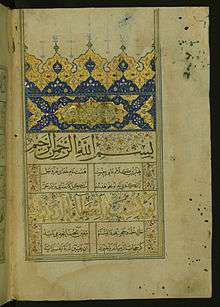Rashid al-Din Vatvat
Rashid al-Din Muhammad Umar-i Vatvāt (Persian: امیر امام رشیدالدین سعدالملک محمد بن محمد بن عبدالجلیل عمری) (d. 1182–1183)[1] was a 12th-century Sunni[2] Khwarezmian[3] panegyrist and epistolographer. He was born in Balkh, (now modern-day Afghanistan).[4]

Incipit Page of One Hundred Sayings by Ali by Rashid al-Din Muhammad Umar-i Vatvāt
Served at the court of Khwarazmshah Kings, although he should not be mistaken for a later physician by the name Amin al-Din Rashid al-Din Vatvat. While serving as court poet, it was through him that Atsiz ibn Muhammad boasted of the end of the Great Seljuq empire.[5]
He also composed qasidehs, but his rhetorical work Hadā'iq al-sihr fi daqa'iq al-shi'r ("Magic Gardens of the Niceties of Poetry") is in prose.[2]
References
- Ihām, Encyclopædia Iranica
- Poets and Prose Writers of the Late Saljuq and Mongol Periods, J. Rypka, The Cambridge History of Iran, Vol. 5, ed. J.A. Boyle, (Cambridge University Press, 1968), 560-561.
- Translation, Arabic into Persian, Louise Marlow, Medieval Islamic Civilization: L-Z, index, Vol. II, ed. Josef W. Meri and Jere L. Bacharach, (Taylor & Francis, 2006), 826.
- Arthur John Arberry, Classical Persian Literature, (Curzon Press Ltd, 1994), 105.
- The Political and Dynastic History of the Iranian World, C.E. Bosworth, The Cambridge History of Iran, Vol. 5, 145.
This article is issued from Wikipedia. The text is licensed under Creative Commons - Attribution - Sharealike. Additional terms may apply for the media files.